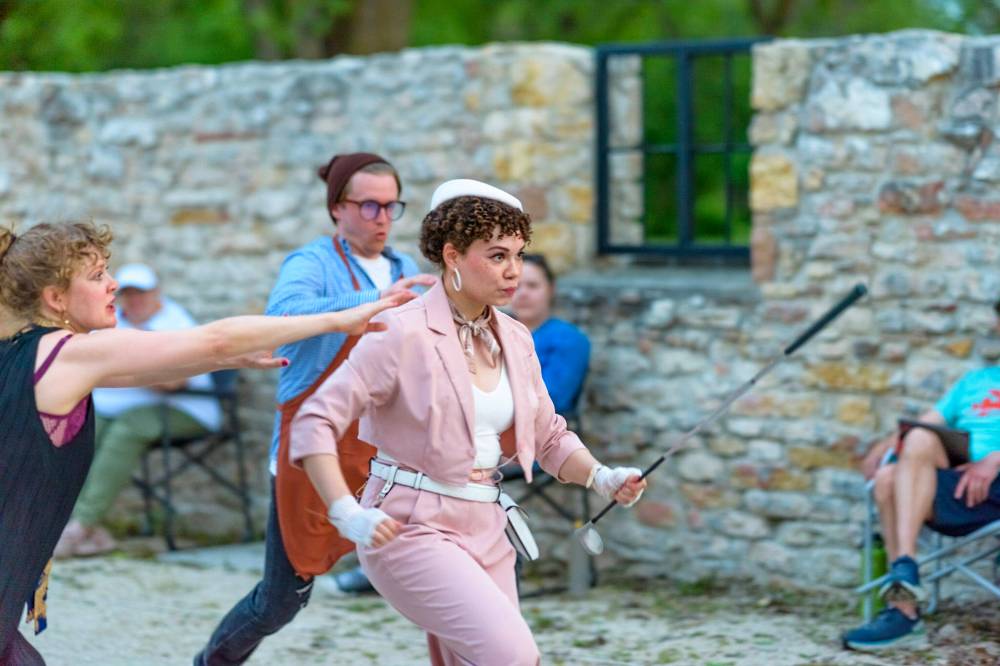
One of Shakespeare’s most energetic comedies, the gender-bending, identity-swapping Twelfth Night requires a nimble mind.
For the talented cast bringing the 400-year-old show to life at the Trappist Monastery Ruins in St. Norbert, it must also require proper cardio training, because the running never stops in a production that covers considerable literal and figurative ground as it delves into the manifold misfortunes of missed connection and misunderstanding.
Shakespeare in the Ruins’ season-opening production is a marathon full of romantic sprints.
Inna Borysevych photo From left: Andrea del Campo, Darren Martens and Melissa Langdon
At first, it’s somewhat difficult to keep up with the restless pace. Washing ashore after a shipwreck as Viola, actor Anaka Maharaj Sandhu quickly transforms into Cesario, who goes to work for Orsino, played by Darren Martens as a sad-boy David Guetta looking for love in this club, swooning to the beat of his own electronic dance music.
Orsino loves Olivia (a tough Victoria Emilie Hill), who falls for Cesario, who falls for Orsino. Meanwhile, Malvolio (played with foolish panache by Tom Keenan) is smitten by Olivia, whose aunt/uncle Sir Toby Belch (an intoxicating, and often intoxicated, flapper played by Andrea del Campo) mischievously intervenes with her band of drunken stooges.
It feels a little bit like high school, with messengers sent racing through the corridors carrying love letters and tokens of appreciation for their friends and leaders. Meanwhile, as per the roving, progressive nature of performances at the Ruins, the audience picks up its chairs and follows along to the next set.
Kayla Gordon photo Darren Martens as Orsino
With a story with this many moving parts, it would be easy for the entire production to devolve into a disorganized frenzy. Indeed, there are some bumps as the audience posts up at each successive set, but that is somewhat expected — you try shepherding more than 100 audience members efficiently from one place to the next.
This disjointed action does break the mood of theatrical engagement. But in a way, the scattered movement echoes the very nature of Twelfth Night’s narrative heart: as more people enter the fray, love becomes a significantly more complicated endeavour.
Thank goodness it’s so damn funny.
Directed by SiR veteran Christopher Brauer, who first acted in Twelfth Night at age 16, the entire ensemble — especially Keenan, del Campo and the saucy Elio Zarrillo — is in top comedic form, playing off each other’s wits while creatively engaging with the sprawling, pastoral setting of the ruins.
Kayla Gordon photo From left: Darren Martens, Andrea del Campo, Tom Keenan and Melissa Langdon in Shakespeare in the Ruins’ production of Twelfth Night.
It’s in moments of improvisation in response to the unpredictable reality of performance that the cast often shines brightest.
As the foolish Feste, Hera Nalam, wearing pop tabs as earrings, eats an audience member’s potato chips. When an airplane zooms over the grounds, Martens, as Fabian, curses the heavens. As a train speeds by, del Campo screams her lines in repetition to overcome the boom. An excellent Maharaj-Sandhu, a talent to watch, even manages to deliver a crucial monologue over the sound of an audience member’s ringing cellphone.
While the set design is sparse — a table here, a chair there — that is not to say it is simple. Brauer and Adam Parboosingh wisely let the trees, the sky and the masonry do most of the heavy lifting. It requires restraint, and it often leads to evocative staging benefited greatly by Mother Nature. As the audience settles into Olivia’s house, petals fall from the trees, and as Viola and Sir Andrew (a giddy Melissa Langdon) duke it out in a stonework dogleg, the moon begins to glimmer in the background.
Inna Borysevych Hera Nalam (as Feste) revels in the setting.
Once the audience adjusts to the cadence of Shakespearean speech, and once it begins to understand who is who and who is in love with whom, the laughter starts to roll.
The outdoor setting has the benefit of allowing cast members to look the viewers straight in the eye. As Malvolio reads a letter thought to have been written by Olivia, Keenan delivers a creepy smile only part of the audience can see; it’s their little secret, but when they laugh, everyone else, even those on the opposite end of the impromptu amphitheatre, is in on the joke.
Because of its keen observation of human relationships, Twelfth Night will always be relevant. But it’s especially pointed for SiR to open a show dealing with the fluidity of gender and sexuality on the first day of Pride month. Audience members quickly adapt to understand shifting pronouns, changing names and progressive character development.
If we can do it at the theatre, and if audiences could do it in 1623, when the show was first published, it shouldn’t be so difficult to adopt in our day-to-day lives.
If you value coverage of Manitoba’s arts scene, help us do more.
Your contribution of $10, $25 or more will allow the Free Press to deepen our reporting on theatre, dance, music and galleries while also ensuring the broadest possible audience can access our arts journalism.
BECOME AN ARTS JOURNALISM SUPPORTER
Click here to learn more about the project.


